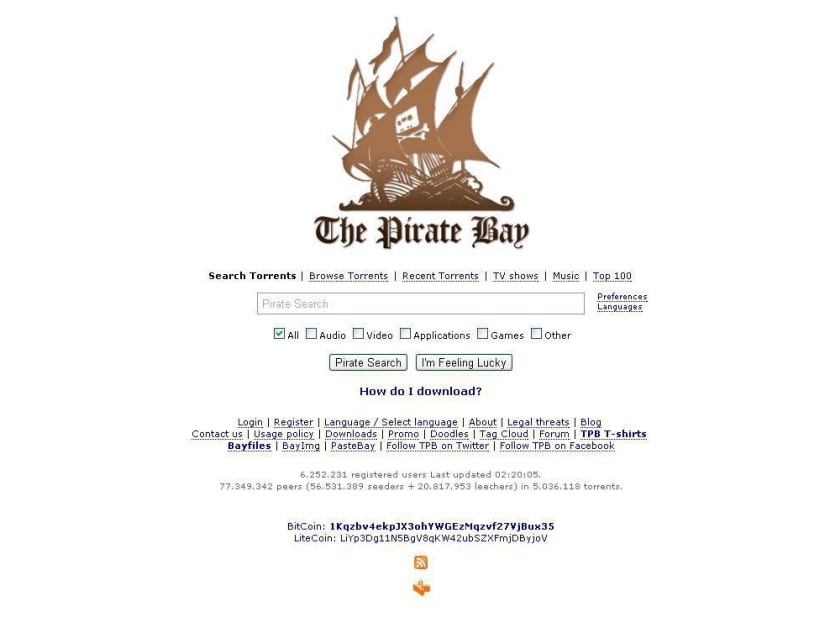MinLaw proposes blocking websites that infringe copyright laws
SINGAPORE — Websites that infringe copyright laws, such as The Pirate Bay, may be blocked by Internet service providers (ISPs) here by the end of the year if proposed amendments to the Copyright Act are approved by Parliament.
SINGAPORE — Websites that infringe copyright laws, such as The Pirate Bay, may be blocked by Internet service providers (ISPs) here by the end of the year if proposed amendments to the Copyright Act are approved by Parliament.
In a statement yesterday, the Ministry of Law (MinLaw) said it was proposing changes that would allow rights holders to directly apply to the High Court for injunctions to block sites that “clearly and blatantly infringe copyright without having to sue the ISPs”.
Currently, rights holders can issue a “take-down” notice to ISPs to request that they disable access to or remove copyright-infringing material from their network. If ISPs choose not to comply, rights holders will need to sue them for copyright infringement or seek an injunction against them. But such a mechanism has not been effective.
“The key existing problem is that the ISP has to be sued and shown to be primarily or secondarily liable for copyright infringement, which naturally makes them very uncomfortable,” said Mr Ang Kwee Tiang, Regional Director (Asia) of the International Federation of the Phonographic Industry (IFPI).
“By introducing a no-liability approach, the stigma of infringement is removed, hence encouraging cooperation from the ISPs,” he added.
Still, “no one singular measure is a silver bullet that can effectively curb online piracy”, he said, although the proposed changes are “definitely a step in the correct direction” and will lower the incidence of online piracy here substantially.
The proposed legislation also suggests having a list of factors to help define egregious sites, such as those whose primary purpose is to commit or facilitate copyright infringement.
The changes would target websites that disregard copyright laws, but they would not affect legitimate search engines and content-sharing sites such as Google and YouTube.
MinLaw added that the United Kingdom, Norway and Belgium have adopted similar legislation and issued injunctions for their ISPs to block sites such as The Pirate Bay. A recent report by the IFPI showed that use of the file-sharing site fell by 68 per cent between January 2012 and December last year in countries where access was denied.
Other approaches for Singapore were considered, such as the graduated response system used in France that requires ISPs to cut off Internet access to users after three warnings for accessing copyright-infringing material, but the ministry said such measures would be “too intrusive on Internet users”.
Industry experts and telcos that TODAY spoke to welcomed the draft Bill. When asked about end-users circumventing the measures through Virtual Private Networks and proxy sites, MinLaw said “no measure, no matter how well it is designed, can deny access to all illegal content”.
Such regulatory measures, it said, “must be complemented by public education efforts”, and legitimate digital services such as Spotify and MediaCorp’s Toggle must be “reasonably priced so that consumers do not need to seek alternatives”.
The Ministry of Education (MOE) said it had already implemented cyber-wellness education in all primary and secondary schools, with the handling of inappropriate content, which includes copyright and piracy, as one of the topics covered.
It also has an ongoing Cyber Wellness Student Ambassador Programme, which promotes the safe and responsible use of technology through peer influence and education among students.
“The direct involvement of students raises their awareness and understanding of cyber issues,” said an MOE spokesperson.
The proposed amendments to the Copyright Act are expected to be tabled in the next few months and, if passed, will come into effect before the end of the year.







